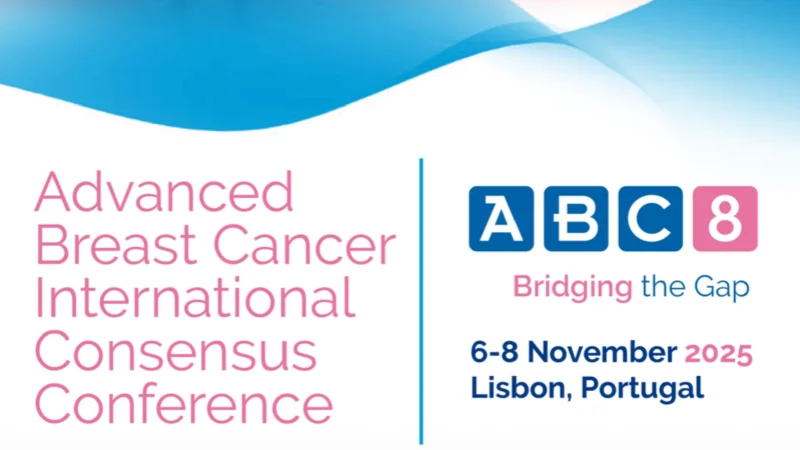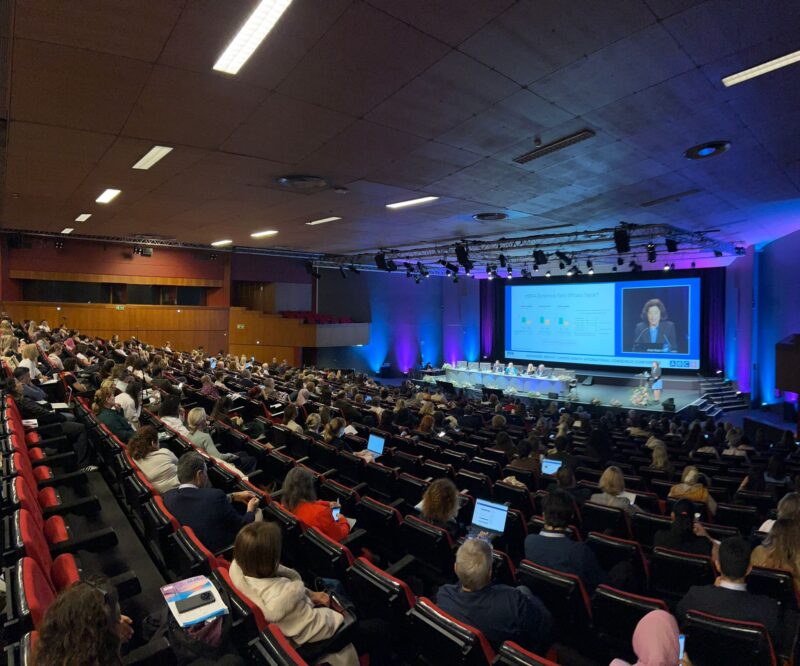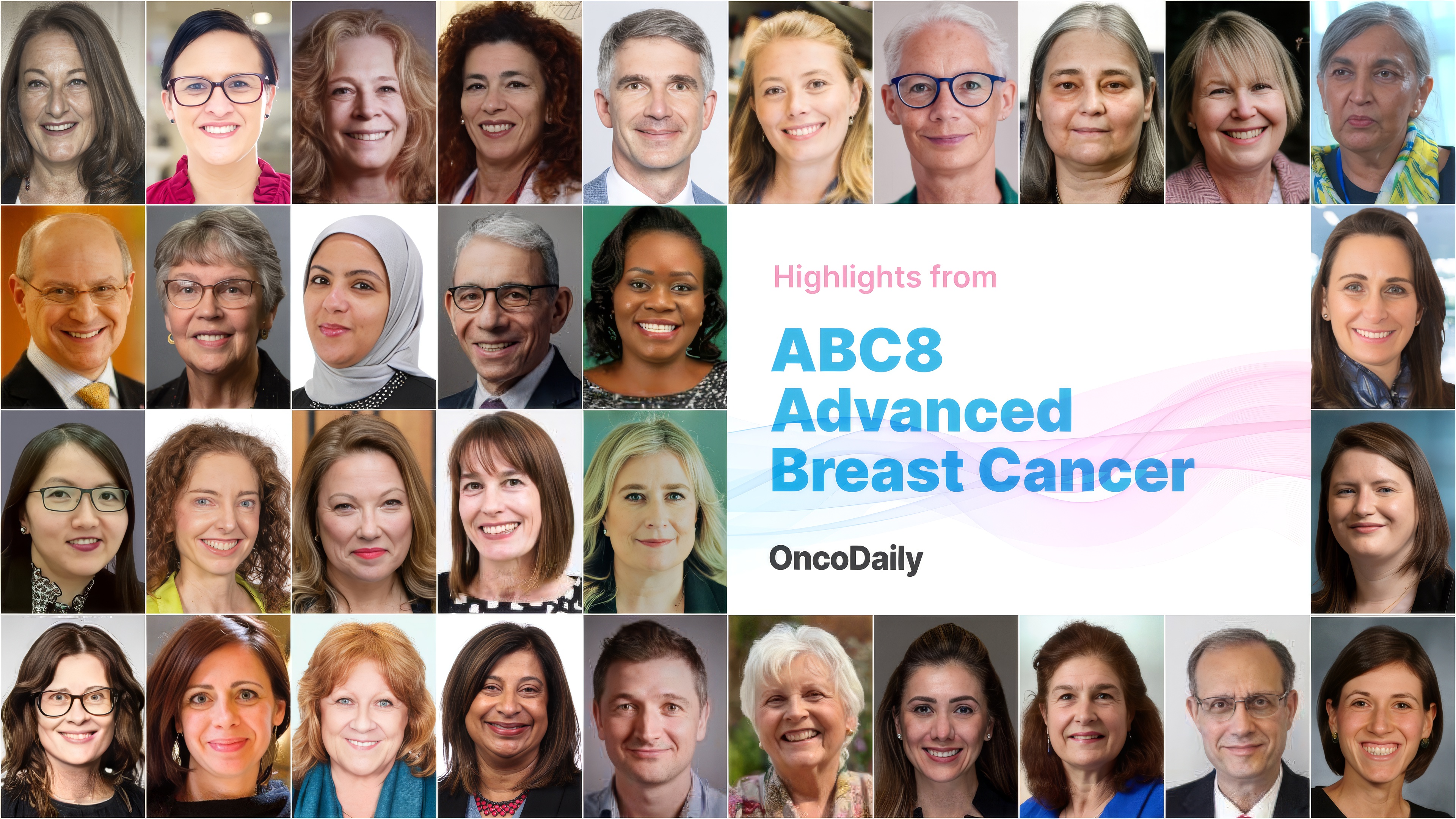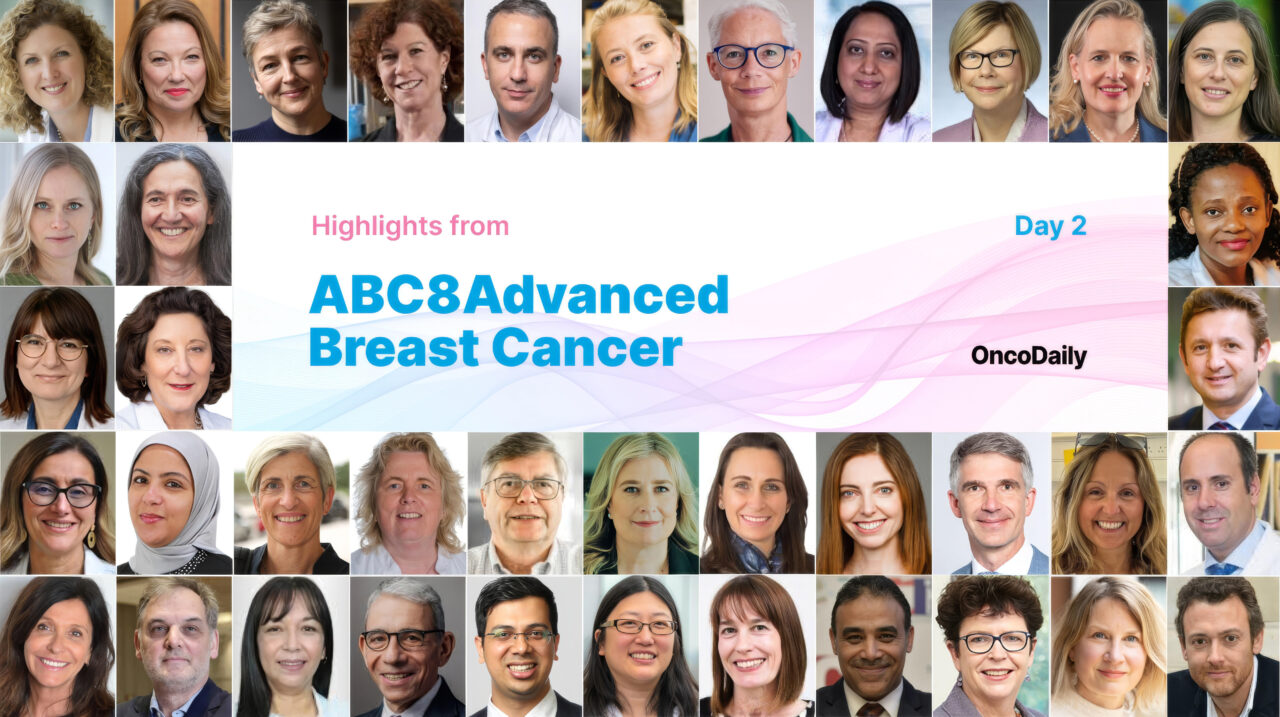The second day of the 8th Advanced Breast Cancer International Consensus Conference (ABC8 2025) in Lisbon built upon the strong scientific and humanistic foundation set on Day 1, turning focus toward the biological, systemic, and societal dimensions of advanced breast cancer (ABC).
Experts, clinicians, researchers, and advocates gathered to explore how progress in molecular profiling, brain metastases management, supportive care, and access equity can be translated into real-world improvement for patients worldwide. The sessions spanned from groundbreaking discussions on ctDNA and next-generation sequencing to thought-provoking dialogues on affordability, stigma, and the meaning of long-term response and survivorship.
Beyond clinical data, ABC8 2025 captured the evolving spirit of the ABC movement—a fusion of science and compassion, where multidisciplinary innovation meets patient advocacy to shape a more inclusive, equitable future for metastatic breast cancer care.

The Evolving Management of Brain and Leptomeningeal Metastases
Chairs: Laura Biganzoli (IT) and Eva Schumacher-Wulf (DE)
The second day of the Advanced Breast Cancer (ABC8) Conference opened with a forward-looking session on one of the most complex and pressing challenges in metastatic breast cancer—the management of brain and leptomeningeal metastases. Once considered uniformly fatal, these complications are now being approached with a more nuanced, multidisciplinary strategy integrating radiotherapy, systemic therapies, and precision imaging.
Nancy Lin (US) began by exploring “The enigma of the blood-brain barrier,” reminding the audience that the central nervous system remains a pharmacologic sanctuary site, often protected from the penetration of many systemic agents. She highlighted advances in drug development—particularly small-molecule HER2-targeted therapies such as tucatinib and trastuzumab deruxtecan, which have demonstrated intracranial activity in both HER2-positive and HER2-low disease. Lin emphasized that future trials must systematically include patients with active brain metastases to close the evidence gap and guide rational sequencing.
Orit Kaidar-Person (IL) discussed “The role of radiotherapy techniques” and underscored how technological refinement has redefined local control. Stereotactic radiosurgery (SRS), hippocampal-sparing whole-brain radiotherapy, and adaptive MR-guided approaches now allow treatment of multiple lesions with reduced cognitive toxicity. She called for closer collaboration between radiation oncologists and medical oncologists to determine when focal therapy can delay or complement systemic treatment, stressing that quality of life should remain the guiding metric.
From a systemic therapy perspective, Javier Cortes (ES) reviewed emerging options beyond HER2-targeted agents, including CDK4/6 inhibitors, PI3K-AKT-mTOR pathway inhibitors, and antibody-drug conjugates with blood-brain barrier permeability. He presented case scenarios illustrating how therapy selection must balance extracranial control with intracranial efficacy and toxicity profile.
The session concluded with a lively case-based discussion on the timing of local versus systemic approaches. The panel agreed that decision-making should be individualized, taking into account lesion number, symptom burden, systemic disease control, and patient preferences. Increasingly, systemic agents with proven CNS activity are shifting the paradigm—allowing some patients to defer or even avoid radiation altogether.
This opening session of Day 2 set an optimistic tone: while brain and leptomeningeal metastases remain a formidable frontier, integrated multimodal care and new therapeutic agents are steadily transforming them from an untreatable complication into a manageable phase of metastatic breast cancer.
Improving Quality of Life for Patients Living with Advanced Breast Cancer
Chairs: Belinda Kiely (AU) and Isabelle Aloi-Timeus (MX)
The next session of Day 2 focused on one of the central missions of the ABC Global Charter—improving quality of life (QoL) for patients living with advanced breast cancer (ABC). The discussion revisited a crucial question: Has quality of life truly improved over the past decade, and what still stands in the way of progress?
Karen Gelmon (CA) opened the session by presenting data from the Global Decade Report (Goal 3), which evaluates global advances in supportive and palliative care integration since 2015. While the report confirmed notable gains in symptom management, access to psychological support, and patient-reported outcome tools, Gelmon emphasized that progress remains uneven. In many regions, particularly in low- and middle-income countries, only a minority of patients have access to dedicated supportive care services. She urged continued investment in survivorship infrastructure and policy reform to ensure quality-of-life measures are treated as essential clinical endpoints rather than optional additions.
Anne May (NL) followed with a compelling lecture on “Exercise and Body Composition,” highlighting robust evidence that structured physical activity reduces fatigue, preserves lean muscle mass, and improves mental well-being in patients undergoing systemic therapy. She underscored that exercise should be prescribed with the same precision as medication—tailored to each patient’s fitness level, treatment phase, and comorbidities. May presented emerging data linking improved body composition to better tolerance of chemotherapy and targeted agents, reinforcing the concept of exercise as a cornerstone of supportive oncology.
Maryam Lustberg (US) then addressed “Optimizing the integration and interface of supportive care and oncological care.” She argued that supportive care must begin at diagnosis of metastatic disease, not at end-of-life. Drawing on U.S. and international models, she described how embedding palliative and symptom management specialists within oncology clinics enhances continuity of care, reduces hospitalizations, and improves both survival and satisfaction. Lustberg emphasized multidisciplinary teamwork and communication as the key to bridging oncologic and supportive disciplines.
The session closed with an open panel discussion moderated by Kiely and Aloi-Timeus, who invited the audience to reflect on the evolving meaning of “living well” with ABC. Consensus emerged that the coming decade must prioritize equity in supportive care access, structured exercise programs, and the global adoption of QoL metrics as co-primary outcomes in clinical trials.
While the past ten years have seen undeniable progress, the panel agreed: improving survival is no longer enough—the true measure of success is how patients live during and beyond treatment.

Photo: ABC Global Alliance
Optimizing Clinical Trials and Drug Development for the Benefit of Patients
Chairs: Shani Paluch-Shimon (IL) and Claire Myerson (UK)
One of the most thought-provoking sessions of Day 2 centered on how to make clinical trials and drug development more patient-centered, scientifically robust, and globally equitable. The discussion tackled dose optimization, innovative trial designs, and the real-world value of emerging endpoints—core themes shaping the next generation of oncology research.
Matti Aapro (CH) opened with a session on dose–response relationships in oncology, emphasizing that the traditional “maximum tolerated dose” (MTD) paradigm may no longer align with modern treatment goals. He noted that while dose intensity remains crucial for cytotoxic agents, targeted therapies and antibody-drug conjugates demand a more nuanced approach—balancing efficacy, safety, and quality of life. Aapro urged for wider adoption of pharmacokinetic- and pharmacodynamic-guided dosing, as well as real-time monitoring tools that individualize therapy rather than relying solely on population-based standards.
Hope Rugo (US) continued with insights into innovative and adaptive trial designs, underscoring how platform studies, basket and umbrella trials, and seamless phase II/III transitions are accelerating discovery while conserving resources. She highlighted that adaptive designs—integrating real-time efficacy data and biomarker-driven eligibility—enable faster decision-making and can reduce the number of patients exposed to ineffective regimens. However, Rugo cautioned that operational complexity, regulatory alignment, and equitable patient access remain major hurdles, particularly in global multicenter studies.
Bishal Gyawali (CA) provided a critical analysis of new clinical trial endpoints, questioning their validity and relevance to patient outcomes. He observed that while surrogate endpoints such as progression-free survival and pathological complete response can expedite drug approvals, they often fail to translate into tangible survival or quality-of-life benefits. Gyawali called for greater accountability in evidence appraisal, suggesting that trials should prioritize endpoints meaningful to patients—such as overall survival, symptom control, and daily functioning—rather than purely radiographic or laboratory metrics. He also highlighted the need for independent post-marketing evaluations and global trial inclusivity, particularly from low- and middle-income regions where data remain sparse.
In the panel discussion, moderated by Paluch-Shimon and Myerson, all speakers agreed that the future of clinical trials must integrate scientific rigor with patient-centered values. Transparent reporting, rational dosing, and pragmatic trial designs will be critical to ensuring that innovation truly benefits those it aims to serve.
This session underscored a defining theme of ABC8: progress in drug development must be measured not only by speed or innovation, but by its real-world impact on patients’ lives.
Long-Term Responders: Maintenance, De-escalation, and the Possibility of Cure
Chairs: Volkmar Müller (DE) and Tanja Spanic (SI)
The closing session of Day 2 shifted the focus to a topic once considered aspirational in metastatic breast cancer—the management of long-term responders and the provocative question of whether “cure” might someday enter the vocabulary of advanced disease.
Joseph Gligorov (FR) began by exploring the evolving role of maintenance therapy in sustaining durable responses. He reviewed evidence across molecular subtypes, emphasizing that the optimal duration and intensity of maintenance remain undefined. In HER2-positive and hormone receptor–positive disease, some patients experience prolonged remission, raising the question of whether therapy should be escalated to consolidate control or de-escalated to minimize toxicity. Gligorov called for biomarker-driven strategies to distinguish true disease dormancy from residual activity, suggesting that circulating tumor DNA (ctDNA) monitoring may offer critical insights for individualized decision-making.
Eric P. Winer (US) tackled the most forward-looking question of the session: Can we talk about cure in advanced breast cancer? He acknowledged that while the term “cure” must still be used cautiously, a subset of patients—particularly those with limited metastatic burden treated with effective targeted therapies—are living more than a decade with no radiographic or biochemical evidence of disease. Winer stressed that understanding the biology of these long-term responders could hold the key to functional cure, highlighting ongoing research into immune surveillance, minimal residual disease, and microenvironmental dormancy.
During the open discussion, chaired by Müller and Spanic, panelists and attendees debated how best to define long-term response in metastatic breast cancer by time, biology, or treatment independence. The conversation underscored the emotional and ethical dimensions of labeling patients as “cured” in a disease long considered chronic. There was broad agreement that terminology should evolve alongside data, focusing on hope without overpromising.
The session closed on an optimistic yet grounded note: the increasing number of long-term survivors is a testament to decades of therapeutic progress. As Müller summarized, “We are not yet curing metastatic breast cancer—but for many patients, we are transforming it into a controllable, long-lived condition. The next decade’s challenge is to understand why—and turn those exceptional outcomes into the norm.”
Accessibility and Affordability: Has the Gap Widened?
Chairs: Hesham Elghazaly (EG) and Sarah Kutika Nyagabona (TZ)
Panel Contributors: Frédérique Penault-Llorca (FR), Charlotte Coles (UK), Stacy Lewis (US), Silvia Neciosup (PE)
The afternoon session at ABC8 tackled one of the most urgent global challenges in cancer care—the growing gap in access and affordability of treatment for patients with advanced breast cancer. Grounded in data from the ABC Global Decade Report 2015–2025 (Goal 9), the discussion examined whether international progress in science and innovation has truly translated into equitable care.
Alex Eniu (CH) opened with findings from the Global Decade Report, highlighting a troubling paradox: while therapeutic options for metastatic breast cancer have expanded dramatically, the gap between high- and low-resource settings has widened. He noted that essential medicines—such as trastuzumab, CDK4/6 inhibitors, and newer antibody-drug conjugates—remain unavailable or unaffordable in many countries. Eniu called for urgent implementation of national cancer control plans, pricing transparency, and global procurement models that prioritize patient access over profit.
Prue Francis (AU) explored the potential of artificial intelligence and telemedicine in narrowing this divide. She described how AI-assisted imaging, digital pathology, and remote consultation platforms can bring expert-level care to regions lacking oncologists or specialized centers. However, Francis warned that digital transformation must not replicate existing inequities—highlighting the importance of infrastructure, digital literacy, and data security in ensuring technology serves both clinicians and patients.
Richard Sullivan (UK) offered a policy-level view on the disconnect between reimbursement rules and advances in clinical practice. He observed that regulatory and payer frameworks often lag behind scientific innovation, delaying the adoption of cost-effective therapies. Sullivan advocated for adaptive health technology assessment (HTA) models and the inclusion of real-world evidence to accelerate equitable reimbursement decisions across healthcare systems.
Pat Garcia-Gonzalez (US), CEO of The Max Foundation, showcased practical models for bridging these gaps through global access initiatives. She shared the success of ATOM (Access to Oncology Medicines) Coalition and The Max Foundation’s patient assistance programs, which have already delivered life-saving therapies to thousands of patients in underserved regions. Garcia-Gonzalez emphasized that sustainable access depends on multistakeholder collaboration—bringing together industry, governments, NGOs, and patient advocates.
In the panel discussion, moderated by Elghazaly and Nyagabona, participants including Frédérique Penault-Llorca, Charlotte Coles, Stacy Lewis, and Silvia Neciosup echoed a shared sentiment: innovation in oncology has little meaning without access. They urged global stakeholders to adopt practical, country-specific solutions—combining policy reform, education, and technology—to ensure every patient, regardless of geography, can benefit from the progress achieved over the last decade.
This session encapsulated a defining theme of ABC8: scientific breakthroughs must be matched by global solidarity and policy innovation, turning discovery into real-world impact for all.
Biology: Translating Molecular Insights into Better Care for Advanced Breast Cancer
Chairs: Rania Azmi (KW), Barbara Pistilli (FR), Lisa Carey (US), François-Clément Bidard (FR)
The final scientific session of Day 2 delved into the rapidly evolving biology of systemic disease, exploring how emerging technologies—from next-generation sequencing (NGS) to liquid biopsy and circulating tumor DNA (ctDNA)—are reshaping the management of advanced breast cancer (ABC).
Lisa Carey (US) opened with “Hallmarks of systemic disease: implications for optimal ABC management,” emphasizing that understanding metastatic biology goes far beyond identifying driver mutations. She described how genomic instability, clonal evolution, and tumor–microenvironment interactions determine not only resistance mechanisms but also therapeutic vulnerabilities. Carey stressed that integrating biological understanding into treatment planning allows clinicians to personalize therapy, improve timing of interventions, and identify patients most likely to benefit from targeted agents or immunotherapy.
Barbara Pistilli (FR) addressed “Revisiting the need, timing, and type of NGS, including liquid and tumor biopsy choices.” She highlighted that while NGS has become a cornerstone of precision oncology, its real-world use in ABC must be guided by clear clinical intent. Tissue-based sequencing remains the gold standard for identifying actionable alterations, but liquid biopsy offers a minimally invasive alternative, particularly when tissue is scarce or inaccessible. Pistilli underscored that repeat profiling at progression can reveal emerging resistance mutations—such as ESR1, PIK3CA, or HER2-low conversion—that directly influence treatment selection.
François-Clément Bidard (FR) followed with a discussion on “Implementing ctDNA in clinical practice: the ongoing challenges.” He summarized key findings from ongoing international studies, including the C-TRAK TN and PADA-1 trials, showing that ctDNA detection can precede radiographic progression by months. However, he cautioned that despite its promise as a monitoring tool, ctDNA testing still faces barriers: lack of standardized assays, uncertain reimbursement, and incomplete integration into treatment algorithms. Bidard called for harmonized global frameworks to translate ctDNA from research to routine care, noting that early detection of molecular relapse could eventually redefine how oncologists approach maintenance and escalation strategies.
During the panel discussion, chaired by Rania Azmi, speakers and audience members reflected on the broader implications of these technologies. Azmi highlighted the need to democratize access to molecular testing worldwide, warning that without equitable access, the precision medicine revolution risks deepening existing disparities.
The session concluded with a shared vision: molecular profiling and real-time disease monitoring are no longer theoretical—they are becoming the foundation of truly individualized care in advanced breast cancer. The challenge ahead lies not in proving their value, but in ensuring that every patient, everywhere, can benefit from them.
News from ABC7: Progress Across HER2+, ER+/HER2–, and Triple-Negative Advanced Breast Cancer
Chairs: Jyoti Bajpai (IN) and Julia Maues (US)
The afternoon session revisited landmark updates from ABC7 (2023) that continue to influence current practice in advanced breast cancer (ABC). With a focus on HER2-positive, hormone receptor–positive/HER2-negative, and triple-negative subtypes, experts examined how these findings have evolved within the context of ABC8 and what they mean for patient outcomes today.
Sandra Swain (US) opened with a review of the HER2-positive ABC landscape, where antibody–drug conjugates (ADCs) have redefined treatment sequencing. She discussed the pivotal role of trastuzumab deruxtecan (T-DXd), which demonstrated unprecedented survival gains and intracranial activity, leading to its adoption as the preferred second-line therapy following trastuzumab and pertuzumab. Swain highlighted ongoing trials exploring T-DXd in combination with immunotherapy and its potential expansion into HER2-low and ultra-low disease, marking a new era of HER2-targeted precision.
Nadia Harbeck (DE) presented updates in ER-positive/HER2-negative ABC, emphasizing how endocrine resistance continues to drive treatment complexity. She noted that CDK4/6 inhibitors remain the backbone of first-line therapy, with OS benefits now established across multiple trials. The introduction of oral SERDs (e.g., elacestrant) and PI3K/AKT pathway inhibitors has broadened the therapeutic armamentarium, offering options for patients with specific genomic profiles such as ESR1 or PIK3CA mutations. Harbeck underlined the importance of biomarker-guided therapy selection and sequential treatment planning to maximize disease control while maintaining quality of life.
Rebecca Dent (SG) turned to triple-negative breast cancer (TNBC), highlighting the impact of immunotherapy and antibody–drug conjugates in transforming outcomes for this historically aggressive subtype. She reviewed data from the KEYNOTE-355, TROPION-Breast01, and ASCENT studies, which collectively established pembrolizumab, datopotamab deruxtecan, and sacituzumab govitecan as central agents in the TNBC treatment continuum. Dent stressed the need for equitable access to biomarker testing—especially PD-L1 and Trop-2 expression—as these determine eligibility for life-prolonging therapies.
In the panel discussion, chaired by Bajpai and Maues, speakers reflected on how ABC7 findings have evolved into ABC8 practice, underscoring that innovation alone is not enough—implementation, access, and individualized treatment sequencing are now the defining challenges. All agreed that sustained collaboration among clinicians, researchers, and patient advocates will be key to ensuring these scientific advances reach every patient who can benefit.
Misconceptions About Advanced Breast Cancer: Breaking the Cycle of Stigma and Isolation
Chairs: Carla Whitbread (UK) and Vicki Durston (AU)
Panel Discussion: Moderated by Chairs with Adele Gautier
The closing session of Day 2 addressed one of the most human yet often overlooked dimensions of advanced breast cancer—the burden of misconceptions, stigma, and social isolation. Speakers shared findings from the ABC Global Decade Report 2015–2025 (Goal 8), offering sobering insights into how misinformation continues to affect patients’ mental health, access to care, and societal inclusion.
Ranjit Kaur (MY) opened with a summary of the decade-long global report, revealing that despite educational progress, stigma around metastatic disease persists in nearly every region. Many patients continue to feel marginalized or misunderstood—both within healthcare systems and in their personal environments. Kaur stressed that language, media narratives, and even public health campaigns often perpetuate misconceptions by focusing primarily on early detection, inadvertently excluding the voices of those living with advanced disease.
Fran Boyle (AU) examined misconceptions among healthcare professionals (HCPs) and how these can directly impact the quality of care. She noted that assumptions about prognosis, treatment futility, or patient preferences can unconsciously influence clinical decision-making and communication. Boyle called for systematic training to help clinicians navigate complex conversations with empathy, avoid bias, and promote hope without creating false expectations. She underscored that high-quality care begins with dismantling outdated beliefs within the medical community itself.
Tanja Spanic (SI) turned the discussion to stigma in the workplace, sharing patient experiences of discrimination, job insecurity, and lack of reasonable accommodations. She emphasized that individuals with metastatic breast cancer often wish to remain professionally active but face structural and attitudinal barriers. Spanic advocated for clear employment protections, workplace flexibility, and recognition of ABC as a long-term, manageable condition rather than a terminal label.
In a deeply personal talk, Claire Myerson (UK) challenged the audience with the question: “Is the life of an ABC patient not enough?” Her message—“I am so much more than my cancer”—captured the essence of patient identity beyond diagnosis. Myerson argued that public health messaging and policy must evolve to view ABC patients not as lost causes, but as valuable members of society deserving investment in research, care, and dignity.
During the panel discussion, moderated by Whitbread, Durston, and joined by Adele Gautier, participants emphasized the need for a cultural shift—from awareness to true understanding. They called for inclusive advocacy campaigns, education for healthcare providers, and legal frameworks protecting patients’ rights to work, insurance, and social participation.
The session closed with a unifying message: dispelling misconceptions is not merely about education—it’s about equity, respect, and belonging. Breaking stigma is essential to improving not only the quality of care but the quality of life for everyone living with advanced breast cancer.
You Can Also Read ABC8 2025 Day 1 Highlights: Key Advances Every Oncologist Should Know by OncoDaily

Written by Aharon Tsaturyan, MD, Editor at OncoDaily Intelligence Unit.


